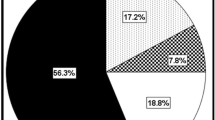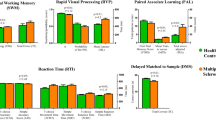Abstract
Studies in which groups of patients with multiple sclerosis (MS) and controls of comparable age and education are compared reveal consistent impairments by the patient groups on test of anterograde explicit memory, controlled attentional processing, information processing speed, and abstract reasoning and problem solving. Vocabulary, naming and visual perception are less often affected. However, the extent of cognitive impairment for individual patients varies from none at all to global dementia. Both physical and cognitive impairment contribute equally to predicting employment status, but some patients with global cognitive impairment can continue to work effectively at mentally demanding professional jobs. Recently developed screening examinations could detect cognitive impairment early and permit interventions when they should be maximally effective. Three key issues in clinical neuropsychology are identified which have not been addressed by traditional neuropsychology. Italian neuropsychology, because of its unique characteristics, could lead in understanding these important questions.
Sommario
Studi di comparazione tra gruppi di pazienti affetti da sclerosi multipla (SM) e gruppi di controllo comparabili per etd e scolarità evidenziano deficit consistenti nei gruppi di pazienti nei test di memoria esplicita anterograda, nello sviluppo dell'attenzione controllata, nella velocit`a di processazione delle informazioni, nel ragionamento astratto, nella capacità di risoluzione dei problemi. Il vocabolario, la denominazione e la percezione visiva sono interessati in modo minore. Tuttavia, l'entità del deficit cognitivo varia nei singoli soggetti dall' assenza alla demenza globale. Sia il deficit fisico che cognitivo contribuiscono in pari misura nel predire lo stato lavorativo, ma alcuni pazienti con deficit cognitivo globale possono continuare a lavorare con efficienza in lavori professionali che richiedono un impegno mentale. Esami di screening recentemente sviluppati potrebbero riconoscere precocemente un deficit cognitivo e permettere interventi nel momento di loro massima efiicacia. Vengono identificati tre aspetti chiave della neuropsicologia che non hanno avuto il sufficiente interesse da par te della neuropsicologia tradizionale. La neuropsicologia italiana, per le sue caratteristiche uniche, potrebbe portare a una migliore conoscenza di questi importanti aspetti.
Similar content being viewed by others
References
Charcot JM (1877) Lectures on diseases of the nervous system. New Sydenham Society, London
McKhann GM (1982) Multiple sclerosis. Annu Rev Neurosci 5:219–239
Beatty WW, Wilbanks SL, Blanco CR, Hames KA, Tivis RD, Paul RH (1996) Memory disturbance in multiple sclerosis: Reconsideration of patterns of performance on the selective reminding test. J Clin Exp Neuropsychol 18:56–62
Beatty WW, Goodkin DE, Monson N, Beatty PA (1989) Cognitive disturbances in patients with relapsing remitting multiple sclerosis. Arch Neurol 46:1113–1119
DeLuca J, Barbieri-Berger S, Johnson SK (1994) The nature of the memory impairments in multiple sclerosis: Acquisition vs. retrieval. J Clin Exp Neuropsychol 16:183–189
Rao SM, Leo GJ, Bernardin L, Unverzagt F (1991) Cognitive dysfunction in multiple sclerosis. I. Frequency, patterns and predictions. Neurology 41:685–691
Beatty WW, Monson N (1990) Semantic priming in multiple sclerosis. Bull Psychol Soc 28:397–400
Beatty WW, Goodkin DE, Monson N, Beatty PA (1990) Implicit learning in patients with chronic progressive multiple sclerosis. Int J Clin Neuropsychol 12:166–172
Grafman J, Rao SM, Bernardin L, Leo GJ (1991) Automatic memory processes in patients with multiple sclerosis. Arch Neurol 48:1072–1075
Rao SM, Grafman J, DiGigulio D et al (1993) Memory dysfunction in multiple sclerosis: Its relation to working memory, semantic encoding and implicit learning. Neuropsychology 7:364–374
D'Esposito M, Onishi K, Thompson H et al (1996) Working memory impairments in multiple sclerosis: Evidence from a dual-task paradigm. Neuropsychology 10:51–56
Paul RH, Blanco CR, Hames KA, Beatty WW Autobiographical memory in multiple sclerosis. J Int Neuropsychol Soc 3: 246–251
Bernardin L (1992) A prospective long-term study of cognitive dysfunction in MS. Presented at the Workshop on Neurobehavioral Disorders in MS: Diagnosis, underlying pathology natural history and therapeutic intervention. 25–27 June 1992, Bergamo (Italy)
Paul RH, Beatty WW, Schneider R, Blanco CR, Hames KH (1998) Impairments in attention in multiple sclerosis. Mult Scler (in press)
Wechsler D (1987) Wechsler memory scale — Revised. Psychological, San Antonio
Wechsler D (1981) Wechsler adult intelligence scale — Revised. Psychological, San Antonio
Rao SM (1986) Neuropsychology of multiple sclerosis: A critical review. J Clin Exp Neuropsychol 8:501–542
Smith AA (1982) Symbol Digit Modalities Test manual. Western Psychological Services, Los Angeles
Beatty WW, Goodkin DE, Hertsgard D, Monson N (1990) Clinical and demographic predictors of cognitive performance in multiple scerlosis: Do diagnostic type, disease duration and disability matter? Arch Neurol 47:305–309
Beatty WW, Paul RH, Wilbanks SL, Hames KA, Blanco CR, Goodkin DE (1995) Identifying multiple sclerosis patients with mild or global cognitive impairment using the Screening Examination for Cognitive Impairment (SEFCI). Neurology 45:718–723
Benton AL, Hamsher K, Varner NR, Spreen O (1993) Contributions to Neuropsychological Assessment. Oxford University, New York
Beatty WW, Monson N (1996) Problem solving in multiple sclerosis: Comparison of the California and Wisconsin Card Sorting Tests. J Int Neuropsychol Soc 2:132–140
Beatty, WW, Hames KA, Blanco CR, Paul RH, Wilbanks SL (1995) Verbal abstraction deficit in multiple sclerosis. Neuropsychology 9:198–205
Rao SM, Leo GJ, St. Hubin Faubert P (1989) On the nature of memory disturbance in multiple sclerosis. J Clin Exp Neuropsychol 11:699–712
Beatty WW, Blanco CR, Wilbanks SL, Paul RH, Wilbanks SL (1995) Demographic, clinical and cognitive characteristics of multiple sclerosis patients who continue to work. J Neuro Rehabil 9:167–173
Rao SM, Leo GJ, Ellington L, Nauertz T, Bernardin L, Unverzagt F (1991) Cognitive dysfunction in multiple sclerosis. II. Impact on employment and social functioning. Neurology 41:692–696
Folstein MF, Folstein SE, McHugh PR (1975) “Mini-Mental State”: A practical method for grading the cognitive state of patients for the clinician. J Psychiatr Res 12:189–198
Beatty WW, Goodkin DE (1990) Screening for cognitive impairment in multiple sclerosis: An evaluation of the MiniMental State Exam. Arch Neurol 47:297–301
Ivnik R (1978) Neuropsychological stability in multiple sclerosis. J Consult Clin Psychol 46:913–923
Amato MP, Ponziani G (1998) Natural history of cognitive dysfunction in multiple sclerosis: a 4-year longitudinal study. Ital J Neurol Sci 19[Suppl]:S388-S391
Paul RH, Beatty WW, Schneider R, Blanco CR, Hames KA (1998) Cognitive and physical fatigue in multiple sclerosis: Relationship between self-report and objective performance. Appl Neuropsychol 5:143–148
Johnson SK, Lange G, DeLuca J, Kom LR, Natelson B (1997) The effects of fatigue on neuropsychological performance in patients with chronic fatigue syndrome, multiple sclerosis and depression. Appl Neuropsychol 4:145–153
Nyenhuis DL, Rao SM, Zajecka JM, Luchetta T, Bernardin L, Garron DC (1995) Mood disturbance versus other symptoms of depression in multiple sclerosis. J Int Neuropsychol Soc 1:291–296
Beck AT, Ward CH, Mendelson M, Mock J, Erbaugh JK (1961) An inventory for measuring depression. Arch Gen Psychiatry 4:561–571
Beatty WW, Monson N (1991) Metamemory in multiple sclerosis. J Clin Exp Neuropsychol 13:309–327
Arnett PA, Rao SM, Bernardin L, Grafman J, Yetkin FZ, Lobeck L (1994) Relationship between frontal lobe lesions and Wisconsin Card Sorting Test performance in patients with multiple sclerosis. Neurology 44:420–425
Filippi M (1998) The contribution of magnetic resonance imaging techniques in the understanding of cognitive impairment in multiple sclerosis. Ital J Neurol Sci 19[Suppl]:S399-S402
Pozzilli C, Pisani A, Gherardi M, Cannoni S, Ciccarelli O (1998) Memory and executive functions in healthy subjects and patients with multiple sclerosis: role of PET and SPECT. Ital J Neurol Sci 19[Suppl]:S403-S407
Zachary RA (1986) Shipley Institute of Living Scale, revised manual. Western Psychological Services, Los Angeles
Damasio AR (1994) Descartes' error: Emotion, reason and the human brain. Avon Books, New York
Author information
Authors and Affiliations
Rights and permissions
About this article
Cite this article
Beatty, W.W. Cognitive dysfunction in multiple sclerosis: natural history and impact on productive living. Ital J Neuro Sci 19 (Suppl 6), S381–S387 (1998). https://doi.org/10.1007/BF00539592
Issue Date:
DOI: https://doi.org/10.1007/BF00539592




